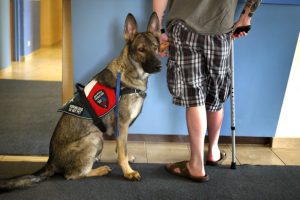 Delta Air Lines (NYSE: DAL) is tweaking its rules regarding the transport of service and support animals after multiple incidents aboard its flights. Starting March 1, owners will be required to provide documentation about their animal’s health and, in some instances, sign a promise of good conduct. Delta said that the rule changes are intended to reduce misbehavior by dogs and other creatures that they are required by law to allow on board.
Delta Air Lines (NYSE: DAL) is tweaking its rules regarding the transport of service and support animals after multiple incidents aboard its flights. Starting March 1, owners will be required to provide documentation about their animal’s health and, in some instances, sign a promise of good conduct. Delta said that the rule changes are intended to reduce misbehavior by dogs and other creatures that they are required by law to allow on board.
Service and support animals must be able to fly at no cost and uncaged, with few exceptions. Service dogs are specially trained to aid people with disabilities. Emotional support animals are mainly used to provide comfort and companionship to their owners. Airlines are not required to accommodate certain service animals, including ferrets, rodents and reptiles.
Proof of health or vaccinations must be submitted through Delta’s website at least 48 hours before the flight. Customers with psychiatric service animals and emotional support animals will also be required to sign a document attesting to the animals’ ability to behave in the cabin. Customers that fail to submit these documents risk being barred from boarding or being removed from the plane.
Unfortunately, some travelers seem to be just trying to avoid the costs of flying with regular pets. Flying with a pet that does not perform a special service generally costs more than $100. According to the airline, people have used the regulations to “fly with comfort turkeys, gliding possums known as sugar gliders, snakes, spiders and more.”
Reports of in-flight animal incidents have risen 84 percent since 2016. Untrained animals urinate, defecate, bark, growl, lunge and exhibit other behavior uncommon among companions that have undergone proper training. On a Delta flight in June, a 70-pound support dog bit a passenger’s face multiple times.
Delta’s new policy is one of the most demanding among major carriers. A spokesman for the airline said the company wants to “better balance” employee and passenger protection with accommodations for disabled customers.
